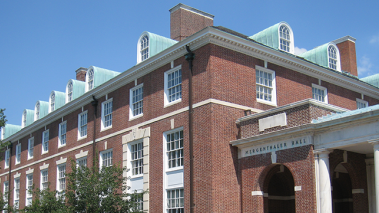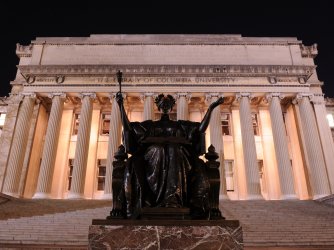Table of Contents
Advocacy Groups Face Discrimination at Johns Hopkins University

Torch readers may remember that in our most recent case at Johns Hopkins University (JHU), the university’s Student Government Association (SGA) put itself on the wrong side of free speech when it wrongly denied the recognition of the student group JHU Voice for Life. Unfortunately, the SGA has been at it again in recent months, and this time its actions threaten an even wider swath of student expression at JHU.
Despite facing a severe backlash, JHU’s SGA reclassified three student organizations—the College Republicans, the College Democrats, and the Hopkins Feminists—this past spring. Formerly classified as “Special Interests and Hobby” groups, these groups joined JHU’s Hopkins J Street U, Voice for Choice, Voice for Life, Students for Justice in Palestine, and Students for Environmental Action in the “Advocacy and Awareness” category.
Why should we care? Thanks to a bill passed by the SGA in April, Advocacy and Awareness groups could potentially receive significantly less funding than non-political and other groups. The bill changed the SGA’s bylaws so that the Student Activities Commission (SAC), which serves as the funding board for the SGA and student organizations, provides variable annual grants only to the following categories of approved student groups: Culture, Performing Arts, Publications and Journals, Special Interest and Hobby, and Religious and Spiritual. The bill singled out Advocacy and Awareness groups for a different funding process, making them eligible only for a $300 annual allotment instead of an annual grant from which they could receive hundreds or thousands more.
While all students organizations at JHU are still eligible to receive monthly SAC grants, Advocacy and Awareness groups’ budgets in 2014 (and, presumably, going forward) are now severely limited due to the SGA’s new funding bylaws. Carrie Resnick, co-president of the Hopkins College Democrats, spoke to The Johns Hopkins News-Letter about the funding problem caused by her group’s reclassification:
“In the past we’ve had $4,000 as our funding, and this year, we found out in the fall that we’d just have $250 like all political organizations. It was crazy. It was like a 97 percent cut,” Co-President of the Hopkins College Democrats Carrie Resnick said.
She said that the cutbacks not only came as a shock but also left her group with inadequate funds to carry out their operations.
“They didn’t tell us last year at all, so we couldn’t prepare for fundraising or anything,” Resnick said. “It was very, very sudden. Like suddenly we just did not have the money we expected to have.”
SGA Executive President Alex Schupper argued that the Hopkins College Democrats’ reclassification was only a naming issue, not a funding cut, but Hopkins College Republicans Vice President and Voice for Life President Andrew Guernsey, whose groups also suffered from the funding restrictions, claimed that the SGA’s actions were intended to stifle the expression of students whose events and viewpoints tend to be most controversial on campus.
“A lot of this stems back to the Voice For Life thing,” Vice President of the JHU College Republicans Andrew Guernsey said. … “There were some students on student government who did not want to see any University funding go to Voice For Life.”
In 2013, Voice for Life’s official club status had originally been denied by the SGA, which claimed that the group’s planned activities and expression constituted harassment under JHU’s policies. Eventually, prodded by a letter from FIRE, a panel of student judges unanimously overturned the SGA’s decision and the group was recognized.
Resnick argued that the funding cuts to the College Democrats and other Advocacy and Awareness groups are especially troubling “because political activism on campus is not super strong, and any way that [political groups’ budgets] would be cut anymore is just not great for the community.”
Fortunately, students are fighting back against the SGA’s funding cuts to political groups. A politically diverse coalition of Advocacy and Awareness groups, including Voice for Life, Voice for Choice, College Democrats, College Republicans, Students for Justice in Palestine, Students for Environmental Action, Hopkins J Street U, and Hopkins Feminists, has formed an organization, Advocacy and Awareness Alliance, to represent the financial concerns of advocacy groups at JHU.
The Advocacy and Awareness Alliance filed a petition calling for a review of the new provision in the SGA’s bylaws limiting Advocacy and Awareness groups to a maximum of $300 in annual SGA funding. The Alliance argues that the SGA’s bylaws violate its constitution, which states, “Students have a right to free speech in all matters relating to the SGA. The spirit of this sentiment shall be extended to all student activities on the Homewood campus.” By restricting the funding of groups that advocate political or social positions, while leaving broader funding options open to groups engaging in other kinds of speech, the SGA is engaging in unfair and unjustified content-based discrimination.
FIRE fought a similar case at Northern Illinois University (NIU), where the group Students for Sensible Drug Policy (SSDP) was told that it would be recognized by the school’s Student Association Senate only as a “political” group, a classification that rendered it ineligible for funding. Groups classified as “religious” were similarly ineligible for funding under existing policies at NIU.
FIRE wrote to NIU, explaining that by discriminating against certain student groups and removing their funding eligibility simply because of the political or religious content of their message, NIU’s Senate was unconstitutionally violating SSDP’s free speech rights.
Following receipt of FIRE’s letter, NIU’s president overruled the Student Association Senate’s ruling and granted SSDP full recognition as an advocacy group eligible for funding. Later that year, the Senate passed a new funding policy that required the Senate to make funding decisions without practicing content- or viewpoint-based discrimination against student groups.
In its constitution, JHU’s SGA makes explicit promises to protect students’ free speech rights. By denying equal funding to groups whose expression may be controversial, the SGA is abandoning that promise. The promise of free speech, like that expressed in the SGA’s constitution, is meaningful only if it extends to speech that has the ability to provoke discussion and dissent. FIRE joins the students of the Advocacy and Awareness Alliance in calling on JHU’s student government to make the commitment to defend the free speech rights of all student groups regardless of the content of their message.
UPDATE: FIRE has received further information regarding the funding disputes at JHU. We have been informed that prior to this year’s funding changes, Advocacy and Awareness groups were ineligible to receive annual funding. While the SGA’s decision to grant Advocacy and Awareness groups annual grants is thus a small step in the right direction, such groups still face unequal treatment in their funding eligibility. Additionally, the fact remains that three groups reclassified as Advocacy and Awareness groups—Hopkins Feminists, College Democrats, and College Republicans—have lost their access to variable annual funding due to the SGA’s changes.
Recent Articles
FIRE’s award-winning Newsdesk covers the free speech news you need to stay informed.

Campus encampment bans rarely violate the First Amendment. Here’s why.

University provosts have bleak outlook on free expression in higher ed

With colleges punishing student protesters, campus due process is more important than ever
